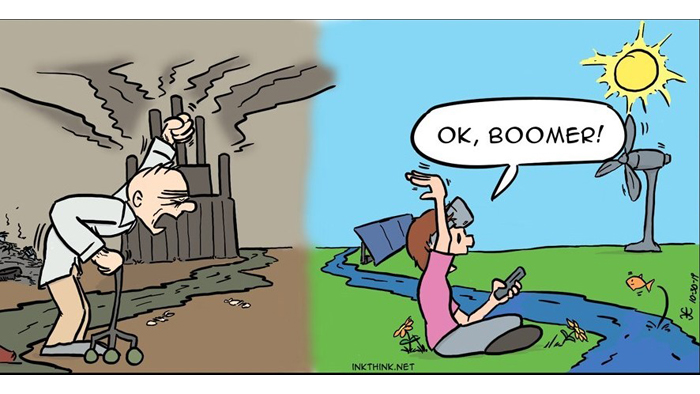
Before there was OK, Boomer, there was Don’t trust anyone over thirty.
OK, Boomer is something young people say to old people, and it’s creeping into what we read in print, on social media, and into what we see on TV.
What does it mean? Is it friendly banter or true criticism of our thoughts and actions?
The Ok, Boomer meme is what predominantly Millennials (those born 1980 through 1996) are saying to us Boomers (most of us readers born between 1946 and 1965) when we criticize their choices and their actions.
It’s a verbal eye-roll.
Boomer: “You shouldn’t use your student loan money to pay bills.”
Millennial: “Ok, Boomer.”
Boomer: “No one’s going to spend $50 on a hoodie when Hanes sells a perfectly good one for $12.”
Millennial: “Ok, Boomer.”
Young person: “Ok Boomer, go back to figuring out how that computing device of yours works.”
Boomer: “I’m part of a generation that stood for the flag, got spanked, drank from a garden hose … and survived.”
Millennial: “Ok, Boomer.
These examples barely scratch the surface of the ways Ok, Boomer is being used to discount the ideas and values of our generation. I suggest you Google this meme if you want the full breadth of, what some might call, a clever quip.
Complicated
The two-word pun is much more complicated than it appears. It has been compared to the n-word of ageism which reflects younger generations’ frustration with Boomers’ actions that have gotten the world into the state it is today. From their point of view, rising inequality, unaffordable college tuition, political polarization exacerbated by the internet, and the climate crisis all fuel anti-boomer sentiment.
One young person put it succinctly:
“Everybody [in Gen Z, born 1996 to 2010] is affected by the choices of the boomers, that they made and are still making. Those choices are hurting us and our future. Everyone in my generation can relate to that experience and we’re all really frustrated by it.
The older generations grew up with a certain mind-set, and we have a different perspective. A lot of them [Boomers] don’t believe in climate change or don’t believe people can get jobs with dyed hair, and a lot of them are stubborn in that view. Teenagers just respond, ‘Ok, Boomer, we’ll prove you wrong; we’re still going to be successful because the world is changing.’”
Right or wrong, Boomers have responded that their generation alone is not responsible for the current state of the world. On the other side, Baby Boomers have accused Millennials of expecting participation trophies for doing the bare minimum.
Should We Be Offended and What Should We Do?
First, we’ve learned, as we age, to pick and choose our battles. Getting offended at something so small as being flippantly targeted by this Ok, Boomer thing is a waste of energy.
Secondly, regardless of how it’s interpreted, the generations that have come after the Boomers are worried. They’re worried life can significantly change for them and their children and grandchildren – change for the worse. One fear is that life can go away instantly, so why bother.
Ok, Boomer allows us to see the widening generation gap between us – the old people – and any of the younger generations. This gap and its resulting worries can be an opportunity, however, to better understand each other.
Instead of creating equally offensive memes or wasting time trying to show younger people the error or their ways (never a good plan for telling any person, young or old!), it’s time for us to listen to what Millennials and all subsequent generations are saying about their concerns. Then we just need to show respect for their concerns and ideas and keep any of our interchanges civil.
[Cartoon courtesy of InkThink]

